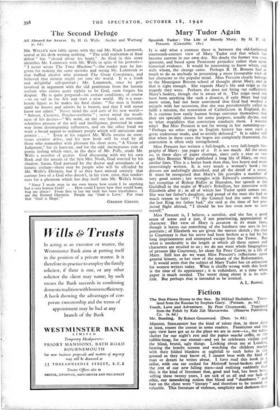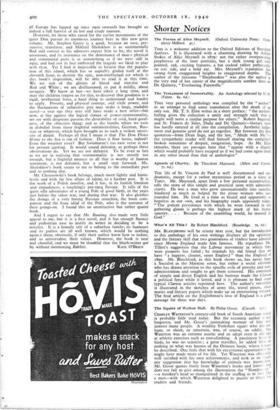Fiction
Mr. Bunting. By Robert Greenwood. (Dent. 7s. 6d.)
Murata. SHOLOKHOV has the kind of talent that, in these days at least, rouses the censor in some readers. Fanaticism and the epic view have got us to the place we are in now—i.e., the tube- shelter for our night's rest and the papier mache coffin, or the rubble-heap, for our eternal—and yet he celebrates virility and the blind, brutal, ugly things. Looking about me at London, hearing the bombs scream and watching the children trudge with their folded blankets at nightfall to such holes in the ground as they may know of, I cannot bear with the kind of man or dream he writes about. I have read this book in a cellar, with one ear cocked for Molotoff bread-baskets and all the rest of our new falling stars—and realising suddenly that this is the kind of literature that, good and bad, has been best- selling these twenty years, I am sick of us all and our lack of ethic, our meandering notion that blood and " dumbness " and hair on the chest were " literary " and therefore to be treated as valuable: This literature of violence, simplicity and darkness that
all Europe has lapped up since 192o onwards has brought us indeed a full harvest of its hot and crude manure.
However, let those who cared for the earlier movements of the quiet Don pursue its enormous journey here in this new great volume. Mr. Stephen Garry is a good, because an easy, per- suasive, translator, and Mikhail Sholokhov is as sentimentally Red and correct as his admirers expect him to be; the novel is enormous, and its insistence on the dominance of man s physical and sentimental parts is as unremitting as if we were still in 1930, and had not in fact embraced the tragedy we liked to play with then. Yet I find it impossible to believe that the popula- tion of this island, which has so superbly girded itself at the eleventh hour, to destroy the epic, non-intellectual rot which is this book's inspiration, will be able to read it at this time. We are sick of the glories of blood and impulse and Red and White ; we are disillusioned, to put it mildly, about savagery. We know at last—we have taken a long time, and may the children forgive us for this, to discover that goodness is a rigid, intellectual force, a hard thing to understand and harder to apply. Poverty, and physical courage, and virile power, and the fluctuations of subjective pity may make a large, readable novel—a year ago they may still have made a best seller—but now, at bay against the logical climax of power-sentimentality, we see with desperate passion the desirability of cold, hard good- ness, of the objective thing; and as the bombs whizz we turn in disbelief from those frightful sentimentalities, German, Rus- sian or whatever, which have brought us to such a violent neces- sity of denial. Perhaps all that I mean is that The Don Flows Home to the Sea is out of fashion. Does it flow home, indeed? Even the weariest river? But Swinburne's too easy verse is not for present quoting. It would sound defeatist, as perhaps these observations do. Yet we are not defeatist. To be even as late as we are in realising that sentimentality is not merely not enough, but a frightful menace to all that is worthy of human sentiment, is not defeatist, but a small step forward. Mr. Sholokhov's book seems to me to belong to the immediate past and to nothing else.
Mr. Choynowski's book belongs, much more lightly and harm- lessly and with far less allure of talent, to a further past. It is the work of a Polish novelist, and it has, in its foolish freedom and impudences, a touchingly pre-1914 flavour. It tells of the quite silly adventures of a young Pole of good birth, in the years just before the other war, and during that war. It also glorifies the doings of a very boring Russian anarchist, the boon com- panion and the beau ideal of the Pole, who is the narrator of their goings-on. I found this an unattractive but rather quaint book.
And I regret to say that Mr. Bunting also made very little appeal to me, but it is a first novel, and it has enough fluency and pedestrian ease to justify its writer in deciding to be a novelist. It is a homely tale of a suburban family; its humours and its pathos are all well known, which would be nothing against them, obviously, if only their author knew how to isolate, and so universalise, their values. However, the book is neat and cheerful, and we must be thankful that the blurb-writer got































 Previous page
Previous page